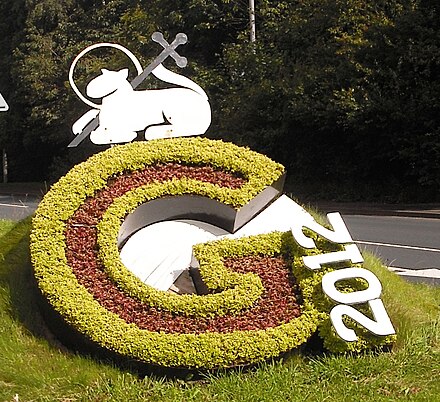Preston (/ˈprɛstən/ ) is a city[a] on the north bank of the River Ribble in Lancashire, England. The city is the administrative centre of the county of Lancashire and the wider City of Preston local government district. Preston and its surrounding district obtained city status in 2002, becoming England's 50th city in the 50th year of Queen Elizabeth II's reign.[2] Preston has a population of 114,300,[citation needed] the City of Preston district 132,000[3] and the Preston Built-up Area 313,322.[4] The Preston Travel To Work Area, in 2011, had a population of 420,661,[5] compared with 354,000 in the previous census. The south bank of the Ribble is part of the Preston urban area, although it forms the South Ribble borough that is administratively separate.
Preston and its surrounding area have provided evidence of ancient Roman activity, largely in the form of a Roman road that led to a camp at Walton-le-Dale. The Angles established Preston; its name is derived from the Old English meaning "priest's settlement" and in the Domesday Book is recorded as "Prestune". In the Middle Ages, Preston was a parish and township in the hundred of Amounderness and was granted a Guild Merchant charter in 1179, giving it the status of a market town. Textiles have been produced since the mid-13th century when locally produced wool was woven in people's houses. Flemish weavers who settled in the area in the 14th century helped develop the industry. In the early-18th century, Edmund Calamy described Preston as "a pretty town with an abundance of gentry in it, commonly called Proud Preston".[6] Sir Richard Arkwright, inventor of the spinning frame, was born in the town. The most rapid period of growth and development coincided with the industrialisation and expansion of textile manufacturing. Preston was a boomtown of the Industrial Revolution, becoming a densely populated engineering centre, with large industrial plants. The town's textile sector fell into terminal decline from the mid-20th century and Preston has subsequently faced similar challenges to other post-industrial northern towns, including deindustrialisation, economic deprivation and housing issues.
Preston is the seat of Lancashire County Council, houses the main campus of the University of Central Lancashire (UCLan) and is home to Preston North End, a founder member of the Football League and the first English football champions in 1889. In that season, the team also won the league and cup double and went unbeaten in the league. It took 115 years until another team went a full season unbeaten. After winning another league title the year afterwards, the team has not won a championship since and their latest major trophy was the 1938 FA Cup.
The demonym for residents of the city is "Prestonian".[7][8]
Preston was recorded in the Domesday Book of 1086 as Prestune.[9] Various other spellings occur in early documents: Prestonam (1094), Prestone (1160), Prestona (1160), Presteton (1180), and Prestun (1226). The modern spelling occurs in 1094, 1176, 1196, 1212, and 1332.[10] The town's name is derived from the Old English words Presta and tun. The tun (enclosure, farmstead, village, manor, estate)[11] of the Presta.[12]
During the Roman period, Roman roads passed close to what is now the centre of Preston. For example, the road from Luguvalium to Mamucium (now Carlisle to Manchester) crossed the River Ribble at Walton-le-Dale, 3⁄4 mile (1 km) southeast of the centre of Preston, and a Roman camp or station may also have been here.[13][14] At Withy Trees, 1+1⁄2 miles (2 km) north of Preston, the road crossed another Roman road from Bremetennacum (the Roman fort at Ribchester) to the coast.[15]
An explanation of the origin of the name is that the Priest's Town refers to a priory set up by St Wilfrid near the Ribble's lowest ford. This idea is supported by the similarity of the Paschal lamb on Preston's crest with that on St Wilfrid's.[16]
When first mentioned in the 1086 Domesday Book, Preston was already the most important town in Amounderness (the area of Central Lancashire between the rivers Ribble and Cocker, including The Fylde and the Forest of Bowland). When assessed for tax purposes in 1218 – 19 it was the wealthiest town in the whole county.[17]

The right to hold a Guild Merchant was conferred by King Henry II upon the burgesses of Preston in a charter of 1179; the associated Preston Guild is a civic celebration held every 20 years, the last being in 2012. It is the only guild still celebrated in the UK.[18]
Before 1328, celebrations were held at irregular intervals, but at the guild of that year it was decreed that subsequent guilds should be held every 20 years. After this, there were breaks in the pattern for various reasons, but an unbroken series were held from 1542 to 1922. A full 400-year sequence was frustrated by the cancellation of the 1942 guild due to World War II, but the cycle resumed in 1952. The expression '(Once) every Preston Guild', meaning 'very infrequently', has passed into fairly common use, especially in Lancashire.
Guild week is always started by the opening of the Guild Court, which since the 16th century has traditionally been on the first Monday after the feast of the Beheading of John the Baptist celebrated on 29 August. As well as concerts and other exhibitions, the main events are a series of processions through the city. Numerous street parties are held in the locality.
In 1952 the emphasis was on the bright new world emerging after the war. The major event, held in the city's Avenham Park, had every school participating, and hundreds of children, from toddlers to teenagers, demonstrated different aspects of physical education in the natural amphitheatre of the park.
The 2012 guild formally opened on 2 September with a mayoral proclamation and the return of "friendship scrolls" that had travelled the world.[19] Highlights in the programme